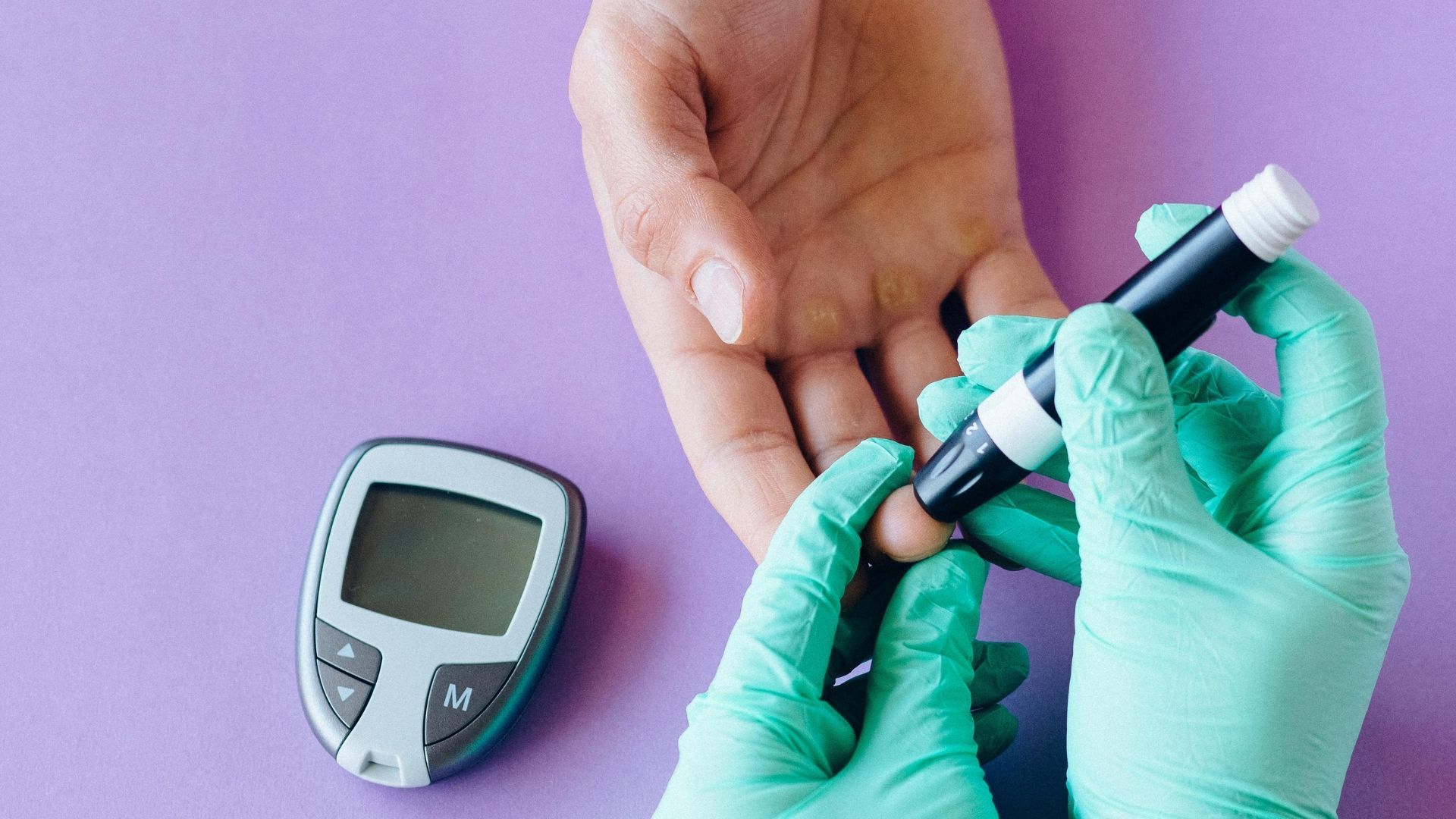Mounjaro for diabetes: how does it work?
How does Mounjaro work for diabetes? Learn what it does to the body and why it's also used to treat obesity.

Mounjaro is an injectable medication that's well known for its effectiveness as a weight loss treatment. When people take Mounjaro along with diet and exercise changes, they can expect to lose around 21% of their starting body weight.
However, Mounjaro isn't only used to help people lose weight. The medication began life as a treatment for type 2 diabetes.
In this guide, we explain how Mounjaro works as a diabetes treatment, who can take it and why it's also used for weight loss.
But first, let's cover the basics.
What is diabetes?
To understand diabetes, we need to know about an important hormone called 'insulin'.
Insulin is produced by the pancreas, an organ that sits just behind the stomach. It's one of our most vital hormones because it allows the body to use up or store sugar (glucose) for energy.
If we do not make enough insulin, sugar does not get used and stays in our blood. This is a problem because high levels of blood sugar can cause damage to our eyes, kidneys, nerves, heart, and blood vessels.
Type 2 diabetes is diagnosed when the body does not produce enough insulin or the insulin it produces does not work properly (insulin resistance). This is the most common form of the disease, affecting around 90% of people with diabetes.
Most people with type 2 diabetes are living with overweight or obesity. This is the main cause of type 2 diabetes.
Type 1 diabetes is much less common, affecting around 8% of people with diabetes.
When a person has type 1 diabetes, their immune system attacks and destroys the cells in the pancreas that make insulin. As a result, people with type 1 diabetes cannot produce insulin at all.
It's possible to develop either type of diabetes at any age. However, type 1 diabetes most often occurs in childhood, while type 2 diabetes usually occurs in people who are middle-aged or older.
There is no known cure for diabetes. However, a pancreas transplant can help slow the damage caused by type 1 diabetes and help with blood sugar control. Type 2 diabetes, meanwhile, can sometimes be put into remission through managed weight loss. Remission is when the symptoms of a disease decrease or disappear altogether.
Mounjaro as a diabetes treatment
You might have heard of Mounjaro (tirzepatide) as a treatment for obesity. However, it's also used to treat type 2 diabetes. At the time of writing, in fact, the drug is only available on the NHS as a diabetes treatment.
Mounjaro is a type of drug called an 'incretin mimetic'. Similar drugs, such as Wegovy, have been successful in helping people lose weight and assisting with blood sugar control in people with type 2 diabetes.
That's why the drug's manufacturer, Eli Lilly, ran clinical trials to examine the effectiveness of both treatment pathways.
The first trial programme, SURPASS, looked at its effectiveness as a type 2 diabetes treatment. It found that participants who took tirzepatide saw 'marked reductions of glycated haemoglobin' (blood cells with excess blood sugar). It also found that 'tirzepatide showed clinically meaningful reductions in body weight'.

The second programme is called 'SURMOUNT' and is ongoing. This trial programme is looking at the drug's effectiveness for weight management. In the first trial, SURMOUNT-1, people who took tirzepatide lost 21% of their starting body weight, on average.
What does Mounjaro do for people with type 2 diabetes?
Mounjaro is an effective treatment for type 2 diabetes because it balances the body's glucose levels in several ways.
- It stimulates the release of insulin, which helps control blood sugar.
- It removes excess sugar from the blood.
- It stops the liver from making and releasing too much sugar.
- It slows down how quickly food leaves the stomach.
- It helps people lose weight by controlling food cravings. Losing weight is important for the management of type 2 diabetes.
How does Mounjaro work as a diabetes treatment?
Mounjaro works similarly to other incretin mimetics such as Wegovy. However, it's unique in that it triggers your body in several ways at once.
Like Wegovy, it mimics the structure of a hormone that tells the pancreas to release more insulin. This hormone is called 'glucagon-like peptide 1' (GLP-1).
The body notices this synthetic hormone and acts as if it has received more of the real thing. It releases more insulin, which uses up more of the sugar in your blood.
But Mounjaro is a two-for-one deal. It also mimics a hormone called 'gastric inhibitory polypeptide' (GIP). GIP has similar effects to GLP-1, so the pancreas releases even more insulin.
Having more of these synthetic hormones also slows down the production of glucagon, a hormone that would normally increase blood sugar.
And that's not all – tirzepatide has one more trick up its sleeve. It slows down how quickly the stomach empties. You will feel fuller for longer, so you'll be less likely to eat between meals. Less food means less sugar for your body to process and – of course – weight loss.
Usually, the effect of GLP-1 and GIP only lasts for a couple of minutes. However, the synthetic version lasts much longer. That's why you only need one dose of Mounjaro each week.
Why is Mounjaro only approved for type 2 diabetes?
Mounjaro's main action is to help the body produce more insulin. Those with type 1 diabetes do not produce any insulin, so Mounjaro cannot help them with that. This is one reason why Mounjaro's manufacturer states that the drug 'is not for use in people with type 1 diabetes'.
However, insulin management is only one part of Mounjaro's mechanism of action. Could its other effects help people with type 1 diabetes control their blood sugar?
A recent study, described as a 'proof of concept', suggests that the answer might be 'yes'.
The study saw patients with type 1 diabetes take tirzepatide for eight months. It found that the drug significantly reduced blood sugar and body weight and was relatively well tolerated by patients.
However, the study was very small in scale, only involving 26 people. More in-depth trials must be carried out before we can say for sure that Mounjaro is safe and effective for people with type 1 diabetes.

What are the side effects?
Mounjaro mimics hormones involved in digestion. That's why some of the most common side effects are related to the stomach and gut. These side effects include nausea, vomiting, tummy pain and constipation or diarrhoea.
For most patients, the side effects are not too bad and normal home remedies bring relief. Many find they become less pronounced as they continue treatment, although moving to a higher dose can bring them back temporarily as the body adjusts.
A small number of people experience hair loss or thinning on Mounjaro. This is not a direct result of the medication – it's because your nutritional balance can be affected by rapid weight loss. Many people find the mild hair loss or hair thinning improves as the treatment continues and they keep taking the recommended supplements.
It's also important to know that Mounjaro can make the contraceptive pill less effective. Fortunately, patches and injections still work as they are absorbed through the skin, not the digestive tract.
This is not an exhaustive list of side effects. For more information, read our guide to the side effects of weight loss drugs or visit the manufacturer's website.
How can I get Mounjaro in the UK?
Mounjaro is available on the NHS in England and Wales as a treatment for type 2 diabetes. It was approved by the National Institute for Health and Care Excellence (NICE) for this purpose in 2023.
However, the drug is not available to all people with type 2 diabetes. Under NICE guidelines, it should only be prescribed when diabetes is not being successfully controlled. In addition:
- Three other medications must have been tried unsuccessfully.
- Weight loss would lead to improvements in other obesity-related health issues.
- The candidate's Body Mass Index (BMI) must be 35 or more and they must have medical or psychological conditions related to obesity.
People of certain ethnic backgrounds may be able to access Mounjaro with a lower BMI because they're more at risk of obesity-related health problems. The BMI cut-off is also lower for those who can't use insulin therapy because the risk of low blood sugar would affect their job.
Can you access Mounjaro on the NHS as a weight loss treatment in England and Wales? At the time of writing, no. However, this will soon change as NHS England plans a small-scale rollout of the drug beginning in March 2025.
However, Mounjaro will initially only be available to a small subset of patients – and the rollout may take an unprecedented 12 years to complete.
The good news is that Mounjaro medication is available now as a weight loss treatment from private health clinics.
When purchased privately through SemaPen, Mounjaro is available to all patients with obesity (those with a BMI of 30 or greater).
You'll also benefit from our cutting-edge cloud-based weight tracking technology, as well as ongoing help and support from our obesity experts – at no extra cost.
To find out whether you're eligible, you can take our free online consultation. Or why not explore our expert guides to learn more about injectable weight loss medications and how they work?
Sources
1. Jastreboff, A.M. et al. (2022) "Tirzepatide Once Weekly for the Treatment of Obesity" New England Journal of Medicine, 387(3) https://doi.org/10.1056/NEJMoa2206038
3. De Block, C. et al. (2022) "Tirzepatide for the treatment of adults with type 2 diabetes: An endocrine perspective" Diabetes Obesity and Metabolism, 25(1) https://doi.org/10.1111/dom.14831
4. Akturk, H.K. et al (2024) "Efficacy and Safety of Tirzepatide in Adults With Type 1 Diabetes: A Proof of Concept Observational Study" Journal of Diabetes Science and Technology https://doi.org/10.1177/19322968231223991












